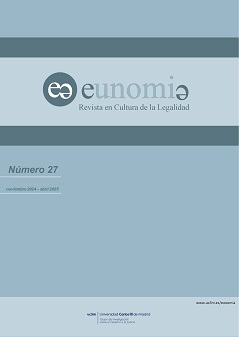Gustavo Zagrebelsky, La justicia como profesión
Abstract
Gustavo Zagrebelsky develops a study on the legal culture of society in La Justicia como profesión. And to do this, it analyzes the complexity of the law from a double perspective. On the one hand, from a popular perspective, lacking legal training, which observes the world of justice as something intricate, mysterious, loaded with symbology and baroque language. And on the other hand, the perspective of jurists, professionals dedicated to a complex field such as the legal field, is prone to doubt and uncertainty. For the former, the Italian professor offers a guide to historical, philosophical and symbolic explanations aimed at popular understanding of the legal field. For the latter, a series of foundations and experiences that will help the jurist address the conflicts inherent to his profession.
Downloads
References
Alexy, R. (1993). Teoría de los derechos fundamentales. Trad. E. Garzón Valdés, Colección el Derecho y la Justicia, CEC.
Consejo General del Poder Judicial (2023). La justicia dato a dato. Año 2023. Estadística judicial. Ed. CGPJ.
Dworkin, R. (1989). Los derechos en serio. Ariel.
Fassó, G. (1983). Historia de la Filosofía del Derecho. Vol. 1. Antigüedad y Edad Media. Pirámide.
García Amado, J. A. y Atienza Rodríguez, M. (2018). Un debate sobre ponderación. Academia Plurinacional de Estudios Constitucionales. Tribunal Constitucional Plurinacional de Bolivia.
García Amado, J. A. (2023). Argumentación jurídica. Fundamentos teóricos y elementos prácticos. Tirant lo blanch.
García Figueroa, A. (2005). La teoría del Derecho en tiempos del constitucionalismo, en Neoconstitucionalismo(s). Trotta.
Jorge Barrio, V. (2016). La abogacía ¿una profesión de riesgo? Diario La Ley, 8682.
Montesquieu, C.L. (1906). Del espíritu de las leyes. Trad. S. García del Mazo. Librería general de Victoriano Suárez.
Muñoz Álvarez, G. (2010). La modernización del lenguaje jurídico. Diario La Ley, 7384.
Rawls, J. (2012). Teoría de la justicia. FCE - Fondo de Cultura Económica.
Sófocles. (2014). Antígona. Trad. J. F. Polo Arrondo. Rialp.
Zagrebelsky, G. (1996). La crucifixión y la democracia. Ariel.
Zagrebelsky, G. (2004). La Ley, el Derecho y la Constitución. Revista Española de Derecho Constitucional, 72, 11-24.
Zagrebelsky, G. (2005). Historia y Constitución. Trotta.
Zagrebelsky, G. (2007). Imparare democrazia. Einaudi.
Zagrebelsky, G. (2008). Principios y votos. El Tribunal constitucional y la política. Trotta.
Zagrebelsky, G. (2009) Intorno alla legge. l dirito come dimensione del vivere comune. Einaudi.
Zagrebelsky, G. (2012a). Giustizia costituzionale. Il Mulino.
Zagrebelsky, G. (2012b). Simboli al potere. Politica, fiducia, speranza. Einaudi.
Zagrebelsky, G. (2014). La ley y su justicia. Tres capítulos de justicia constitucional. Trotta.
Zagrebelsky, G. (2016). El derecho dúctil. Ley, derechos, justicia. (11ª ed.). Trotta.
Zagrebelsky, G. (2017). Libres siervos. El Gran Inquisidor y el enigma del poder. Trotta.
Zagrebelsky, G. (2018). Diritto allo specchio. Passaggi Einaudi.
Zagrebelsky G. y Canfora L. (2020). La máscara democrática de la oligarquía. Un diálogo al cuidado de Geminello Preterossi. Trotta.
Zagrebelsky, G. (2021). La Giustizia come professione. Passaggi Einaudi.
Zagrebelsky, G. (2019). Mai più senza maestri. Il Mulino.
Zagrebelsky, G. (2022). La lezione. Einaudi.
Zagrebelsky, G. (2023). Tempi difficili per la Costituzione. Gli smarrimenti dei costituzionalisti. Laterza.
Zagrebelsky, G. (2024). La justicia como profesión. Palestra.
Eunomía. Revista en Cultura de la Legalidad is a duly registered journal, with EISSN 2253-6655.
The articles published in Eunomía are –unless indicated otherwise– under a Creative Commons Attribution-No Derivative Works 3.0 Spain license. You can copy, distribute and communicate them publicly as long as you cite their author and the journal and institution that publishes them and do not make derivative works with them. The full license can be consulted at: http://creativecommons.org/licenses/by-nd/3.0/es/deed.es
Funding data
-
Ministerio de Ciencia, Innovación y Universidades
Grant numbers PID2020-119806GB-100




